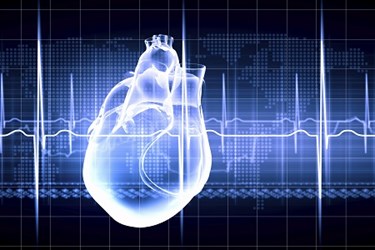Abbott's Troponin Test Measures Effect Of Mental Stress On Heart

Research of the protein troponin has been used to develop tests that can diagnose or rule out heart attacks, and now scientists are using that technology to shed new light on the progression of coronary artery disease (CAD). A recent study of Abbott’s Architect STAT High Sensitive Troponin-I test examines the impact of different kinds of stress on cardiac health, with hopes of developing new preventative approaches to heart disease.
Troponin is a protein integral to muscle contraction in the skeleton and heart, and research has shown that elevated levels of troponin circulating in the blood is an indicator of myocardial damage, the most common cause of which is a heart attack. Recent research has been working to assign prognostic value to different troponin levels so that clinicians may gauge who has experienced a cardiac event and perhaps identify who is at an elevated risk, according to the Mayo Clinic.
Abbott’s Architect STAT High Sensitive Troponin-I test — which received CE Mark in Europe in January 2013 — can detect very low levels of the protein and is shown to confirm or rule out imminent heart attacks much earlier than conventional tests. Last September, preliminary results of a study at the University of Edinburgh showed that, by detecting troponin at lower levels, doctors may be able to achieve greater success in diagnosing heart attacks in women.
Researchers from Emory University School of Medicine are now using Abbott’s test to study the beginnings of myocardial damage at even earlier stages by linking troponin levels to ischemia (inadequate levels of oxygen flowing to heart muscles) brought on by stress and establishing an even stronger correlation between stress and cardiac health.
“We’ve always believed that stress can be harmful to cardiac health. We now show that this harm is also reflected by elevated levels of circulating troponin,” said Arshed Quyyumi, co-director of the Emory Clinical Cardiovascular Research institute, in a press release.
Using Abbott’s test, Emory researchers evaluated the troponin levels of 587 CAD patients before and after they underwent both mental and stress tests. Their results, which were presented at the American College of Cardiology 65th Annual Conference, found that 16 percent of patients developed ischemia during mental stress tests and 34.8 percent during physical stress tests.
“Until now, doctors have never had a way of measuring the impact of stress on the heart so that we have the necessary information to begin to address the problem,” said Agim Beshiri, senior medical director of diagnostics at Abbott.
Quyyumi added that this revelation could lead to the development of earlier interventions. “Doctors may eventually use this information to prevent serious complications [such as heart attacks] from developing.”
In 2013, Silicon BioDevices developed a handheld device that could produce lab quality troponin test results in patients who present with symptoms associated with a heart attack in minutes. A team of Korean scientists recently introduced another point-of-care troponin test with a simple and transportable design that could diagnose heart attacks in areas where medical resources are limited.
